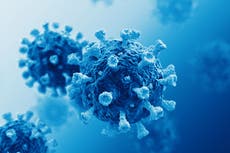Extend list of Covid symptoms to pick up missing infections, scientists say
Only those with a cough, fever and loss of smell are currently eligible for PCR test from the NHS
Extending the symptoms for Covid-19 beyond the “classic triad” of cough, fever and loss of smell could help to detect millions more infections, scientists have said.
Anyone who feels unwell has been urged to get a test by the researchers behind a new study which suggests that broadening the list of symptoms to include fatigue, sore throat, headache and diarrhoea would help pick up around a third more Covid-19 cases.
Currently, only those with a persistent cough, high temperature and loss of smell – known as anosmia – are eligible for a PCR test through the NHS.
The findings are based on data from 122,000 UK adults who reported symptoms via the Zoe Covid app. Of these, 1,202 returned a positive PCR test result within a week of first feeling ill.
Researchers from King’s College London (KCL) and the Coalition for Epidemic Preparedness Innovations (Cepi) found that testing people with any of the three classic symptoms would have spotted 69 per cent of symptomatic cases, with 46 people testing negative for every person testing positive.
But the researchers said that extending the list of symptoms to fatigue, headache, sore throat and diarrhoea in the first three days of illness would have detected 96 per cent of symptomatic cases, with 95 testing negative for every positive test.
In addition, the researchers found that 31 per cent of people who are ill with Covid-19 do not have any of the classic symptoms in the early stages of the disease when most infectious.
Professor Tim Spector, lead scientist on the Zoe app and professor of genetic epidemiology at KCL, said: "We've known since the beginning that just focusing testing on the classic triad of cough, fever and anosmia misses a significant proportion of positive cases.
"We identified anosmia as a symptom back in May and our work led to the government adding it to the list; it is now clear that we need to add more.
"By inviting any users who log any new symptoms to get a test, we confirmed that there are many more symptoms of Covid-19.
"This is especially important with new variants that may cause different symptoms. For us, the message for the public is clear: if you're feeling newly unwell, it could be Covid and you should get a test."
The team said their findings could also be used in clinical trials to assess the effectiveness of potential Covid-19 vaccines.
Dr Jakob Cramer, head of clinical development at Cepi, said: "Accurate diagnosis of Covid-19 cases is crucial when assessing the efficacy of Covid-19 vaccine candidates in large-scale studies, especially since the signs and symptoms associated with the disease are extensive and overlap with other common viral infections.
"The findings of this study provide important insights that will help optimise the choice of triggering symptoms for diagnostic work-up in Covid-19 vaccine-efficacy trials.
"We hope the findings of this study will not only aid Cepi's Covid-19 vaccine development partners but also the wider research and development community."
A spokesperson for the Department of Health and Social Care said: "An expert scientific group keeps the symptoms of Covid-19 under review.
"The main symptoms have been carefully selected to capture those most likely to have Covid-19, while not capturing a great number of people who do not.
"Anyone experiencing the main symptoms – a high temperature, a new continuous cough, or a loss or change to sense of smell or taste – should get a test as soon as possible and immediately self-isolate along with their household."
Join our commenting forum
Join thought-provoking conversations, follow other Independent readers and see their replies
Comments

Bookmark popover
Removed from bookmarks